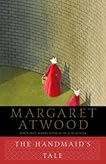 The Handmaid's Tale by Margaret Atwood
The Handmaid's Tale by Margaret AtwoodMy rating: 4 of 5 stars
I've always heard that The Handmaid's Tale by Margaret Atwood was one of those books you had to read. I picked it up at my favorite used book store: Falls River Books and nominated it for my book club's July selection. It was haunting, frustrating and I couldn't put it down. I was compelled to keep going from the narrator's first person voice when she tells us that she has to wear red and it's not her color. I thought to myself, here is a narrator in dire circumstances who still has some time to joke -- maybe I'll even like this person.
This person is the 33-year-old Offred whose real name is probably June. She is kept girl, or handmaiden, of Commander Fred and Serena Joy. Get it? She's "Of Fred." The other handmaidens also have male names such as Ofglen, Ofwarren and so forth. They dress in these medieval nun costumes of full head to toe red gowns with white headresses that prevent them from seeing the outside world and from the outside world seeing them. They hardly do any labor except going to the market once a day for their household and they aren't allowed to read. Offred has to have sex once a month with her master Fred PLUS his wife who is lying underneath her in this ceremony that hopefully will produce an heir for the commander.
The U.S. before the Republic of Gilead takeover was bleak: there was massive pornography, pollution, disease and suffering. The new leaders promised a change and boy did they deliver. June (the narrator), Luke, her husband, and their daughter who is never named try to cross the border into Canada, but June and daughter are captured. They are captured because women who is married to a divorced man is a sinner and adultress. We never know what happens to Luke. June is sent to handmaiden school since the government knows she has viable ovaries because she's already a mother and her daughter is adopted by a childless commander and his wife.
The commanders and their wives seem to be in their fifties and the young men are off fighting the wars. The poorer people are left alone and the undesirables (Unwomen) are sent to the Colonies to do toxic clean up detail without benefit of Hazmat suits. Offred's mother is one of the Unwomen since she is an unrepentant feminist.
As the novel progresses, we learn about the goings on in Offred's house and about how the other people in the house feel about her. We know right away there's an attraction between her and Nick, the Commander's manservant. Cora the maid likes her, while Rita the maid thinks she's a slut just because she's a handmaiden. Cora is perpetually afraid Offred will commit suicide because the last one they had did. Serena Joy dislikes her and the Commander sneaks around with her to play Scrabble (one of the funniest parts in the book).
The government hasn't taken everything away from Offred: she still remembers her daughter, her life before, her job, her husband and how it all ended. I was surprised they hadn't blanked her memory. Offred is a passive woman and she'd rather get along than claw her way through to freedom. She wants to live and thinks that if she keeps her head down and doesn't cause much trouble she'll do fine. Unfortunately,this can't be the case. In her small world she runs into Ofglen who is part of the resistance, and she interacts illegally with the two men living around her: the Commander and Nick. Events propel her forward and by virtue of who she is things happen. She is part of the political machine and their agenda for babies wherever she goes.
Unlike 1984 by George Orwell where we got the entire background and history of this dystopia all at once, in this book we get the history in bits and pieces. I liked how this book is like a puzzle and it's not all laid out for the reader. This pattern mirrors Offred's way of receiving information since she can't read and look up things; she has to get her knowledge in bits and pieces, too. By the end of the book, the reader should have a good idea of how Gilead came to be along with its rules and power structure.
Margaret Atwood criticizes both the right and the left in her novel. She's against feminists banning pornography since she feels that's censorship and Atwood's against the right taking arms against society's ills. The theme is that both sides can go to extremes and they do so in Handmaid's Tale.
This novel isn't dated and it still holds up well some 23 years after it was published. It's a haunting vision of what would happen if the people in charge decided to turn back the clock on womens' rights and strip women of their voices. Not only do women suffer, but so do men.
Read this book for Atwood's images, poetry and turns of phrase. Also read it for its well-thought out themes. I promise you, you'll never forget this book.
View all my reviews >>
Here are the discussion questions for this book:
The Handmaid’s Tale Reading Group Guide
1. The novel begins with three epigraphs. What are their functions?
2. In Gilead, women are categorized as wives, handmaids, Marthas, or Aunts, but Moira refuses to fit into a niche. Offred says she was like an elevator with open sides who made them dizzy; she was their fantasy. Trace Moira's role throughout the tale to determine what she symbolizes.
3. Aunt Lydia, Janine, and Offred's mother also represent more than themselves. What do each of their characters connote? What do the style and color of their clothes symbolize?
4. At one level, The Handmaid's Tale is about the writing process. Atwood cleverly weaves this sub-plot into a major focus with remarks by Offred such as "Context is all, " and "I've filled it out for her, " "I made that up, " and "I wish this story were different." Does Offred's habit of talking about the process of storytelling make it easier or more difficult for you to suspend disbelief?
5. A palimpsest is a medieval parchment that scribes attempted to scrape clean and use again, though they were unable to obliterate all traces of the original. How does the new republic of Gilead's social order often resemble a palimpsest?
6. The Commander in the novel says you can't cheat nature. How do characters find ways to follow their natural instincts?
7. Why is the Bible under lock and key in Gilead?
8. Babies are referred to as "a keeper, " "unbabies, " "shredders." What other real or fictional worlds do these terms suggest?
9. Atwood's title brings to mind titles from Chaucer's The Canterbury Tales. Why might Atwood have wanted you tomake that connection?
10. What do you feel the "Historical Notes" at the book's end add to the reading of this novel? What does the book's last line mean to you?








